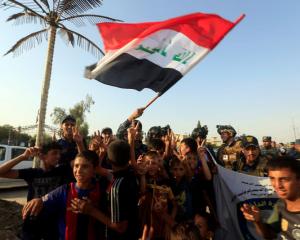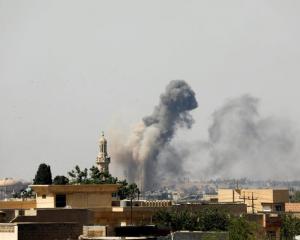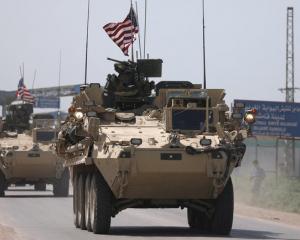The attacks that appeared to pitch al Qaeda-linked Sunni Muslim insurgents against Shi'ites raised fears of a return to the widespread sectarian carnage that tore Iraq apart and cost thousands of lives in 2006 and 2007.
The violence breaks weeks of relative calm as Shi'ite Prime Minister Nuri al-Maliki and Sunni leaders have sought to resolve a political crisis that threatened to unravel their power-sharing agreement following the US withdrawal.
At least 32 people were killed in blasts in Baghdad where 10 explosions tore through mainly Shi'ite neighbourhoods during rush hour and other attacks targeted police patrols, commuters and crowds gathered in shopping areas.
"We were sitting at a restaurant having soup for breakfast when the bomb exploded. I lost consciousness and then saw smoke and dust when I came to. I saw people and body parts everywhere," police officer Ahmed Kadhim told Reuters.
Kadhim suffered shrapnel wounds to his left leg and back when a car bomb exploded near a restaurant killing six people and wounding 18 in Baghdad's northern Kadhimiya district.
The interior ministry blamed al Qaeda and affiliated armed groups for the attacks it said were an attempt to show that Iraq's security situation remained unstable.
The blasts hit just weeks before Baghdad plans to host an Arab League summit, which has been postponed because of regional turmoil and acrimony between Iraq's Shi'ite-led government and some Sunni Gulf states.
Holding a successful summit at the end of March would help Iraq restore its place in the Arab World since the US withdrawal and help allay Sunni Gulf States worries over Iran's influence over Iraq's Shi'ite government.
"The attacks aimed to spark sectarian strife among the Iraqi people, and to prevent the Arab League meeting from being held," Parliament Speaker Osama al-Nujaifi said.
More than a dozen blasts and attacks hit other cities across Iraq from Mosul in the north to Hilla, south of Baghdad, many of them targeting police.
The violence was aimed at Shi'ite neighbourhoods but also against security forces, a frequent target of Sunni insurgents. Iraqi officials had predicted such groups would try to stir sectarian tensions with attacks after American forces went home.
While violence has ebbed since the height of the war, Sunni insurgents affiliated to al Qaeda are still capable of large-scale assaults. Some rival Shi'ite militias have said they will cease fighting since the US withdrawal.
Islamic State of Iraq, an umbrella group for al Qaeda-linked insurgents in Iraq, has claimed responsibility for recent large attacks on the capital, including a December 22 wave of bombings that killed at least 71 people.
In Thursday's violence, one car bomb in the capital killed at least nine people and wounded 27 in the upmarket Karrada neighbourhood, hurling shrapnel into the next street and blowing out glass from nearby buildings.
Witnesses saw at four wrecked cars full of shrapnel and bloodied seats near an ice-cream shop at the site of another blast.
In at least three Shi'ite neighbourhoods in Baghdad, nine policemen were killed, and in the capital's northwestern Kadhimiya district, a car bomb killed six people when it struck a street lined with restaurants.
In the biggest attack outside the capital, a car bomb killed seven people and wounded 33 in the town of Balad, north of Baghdad.
Iraq's political crisis erupted after Maliki moved against two senior members of the Sunni-backed Iraqiya political bloc shortly after the U.S. troop withdrawal in December, prompting a walkout by Iraqiya lawmakers that lasted until late January.
Tensions eased as Sunni, Shi'ite and Kurdish blocs tried to negotiate an end to the crisis. But a week ago a panel of judges detailed 150 attacks they said were carried out by death squads under Sunni Vice President Tareq al-Hashemi's command. Maliki sought Hashemi's arrest in December.
Hashemi, who has taken refuge in the autonomous region of Kurdistan, has denied accusations made against him, dismissing them as part of a plot to destroy Maliki's opponents.
The crisis was followed by a wave of attacks in December and January on Shi'ite neighbourhoods, including a suicide bombing on a Shi'ite funeral procession that killed 31 in Baghdad and an attack on Shi'ite pilgrims that left 53 dead in Basra.
Violence had ebbed until Sunday when a suicide car bomber killed 19 people in an attack on a Baghdad police academy.









